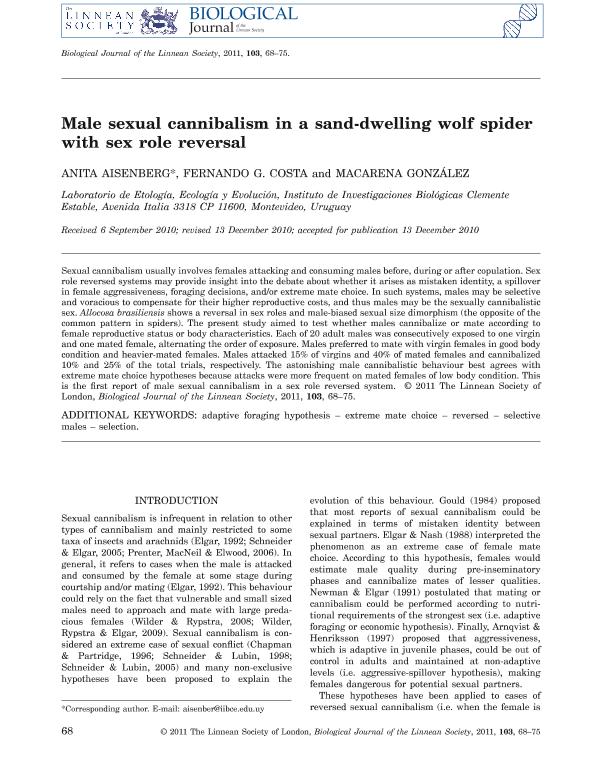Mostrar el registro sencillo del ítem
dc.contributor.author
Aisenberg Olivera, Anita Diana

dc.contributor.author
Costa, Fernando G.
dc.contributor.author
González Pérez, María de la Macarena

dc.date.available
2023-03-13T17:15:47Z
dc.date.issued
2011-05
dc.identifier.citation
Aisenberg Olivera, Anita Diana; Costa, Fernando G.; González Pérez, María de la Macarena; Male sexual cannibalism in a sand-dwelling wolf spider with sex role reversal; Wiley Blackwell Publishing, Inc; Biological Journal of The Linnean Society; 103; 1; 5-2011; 68-75
dc.identifier.issn
0024-4066
dc.identifier.uri
http://hdl.handle.net/11336/190361
dc.description.abstract
Sexual cannibalism usually involves females attacking and consuming males before, during or after copulation. Sex role reversed systems may provide insight into the debate about whether it arises as mistaken identity, a spillover in female aggressiveness, foraging decisions, and/or extreme mate choice. In such systems, males may be selective and voracious to compensate for their higher reproductive costs, and thus males may be the sexually cannibalistic sex. Allocosa brasiliensis shows a reversal in sex roles and male-biased sexual size dimorphism (the opposite of the common pattern in spiders). The present study aimed to test whether males cannibalize or mate according to female reproductive status or body characteristics. Each of 20 adult males was consecutively exposed to one virgin and one mated female, alternating the order of exposure. Males preferred to mate with virgin females in good body condition and heavier-mated females. Males attacked 15% of virgins and 40% of mated females and cannibalized 10% and 25% of the total trials, respectively. The astonishing male cannibalistic behaviour best agrees with extreme mate choice hypotheses because attacks were more frequent on mated females of low body condition. This is the first report of male sexual cannibalism in a sex role reversed system. © 2011 The Linnean Society of London.
dc.format
application/pdf
dc.language.iso
eng
dc.publisher
Wiley Blackwell Publishing, Inc

dc.rights
info:eu-repo/semantics/openAccess
dc.rights.uri
https://creativecommons.org/licenses/by-nc-sa/2.5/ar/
dc.subject
ADAPTIVE FORAGING HYPOTHESIS
dc.subject
EXTREME MATE CHOICE
dc.subject
REVERSED
dc.subject
SELECTION
dc.subject
SELECTIVE MALES
dc.subject.classification
Zoología, Ornitología, Entomología, Etología

dc.subject.classification
Ciencias Biológicas

dc.subject.classification
CIENCIAS NATURALES Y EXACTAS

dc.title
Male sexual cannibalism in a sand-dwelling wolf spider with sex role reversal
dc.type
info:eu-repo/semantics/article
dc.type
info:ar-repo/semantics/artículo
dc.type
info:eu-repo/semantics/publishedVersion
dc.date.updated
2023-03-10T14:33:08Z
dc.identifier.eissn
1095-8312
dc.journal.volume
103
dc.journal.number
1
dc.journal.pagination
68-75
dc.journal.pais
Reino Unido

dc.journal.ciudad
Londres
dc.description.fil
Fil: Aisenberg Olivera, Anita Diana. Instituto de Investigaciones Biológicas "Clemente Estable"; Uruguay
dc.description.fil
Fil: Costa, Fernando G.. Instituto de Investigaciones Biológicas "Clemente Estable"; Uruguay
dc.description.fil
Fil: González Pérez, María de la Macarena. Universidad Nacional de Córdoba. Facultad de Ciencias Exactas, Físicas y Naturales. Cátedra de Diversidad Animal I; Argentina. Consejo Nacional de Investigaciones Científicas y Técnicas; Argentina
dc.journal.title
Biological Journal of The Linnean Society

dc.relation.alternativeid
info:eu-repo/semantics/altIdentifier/url/https://onlinelibrary.wiley.com/doi/full/10.1111/j.1095-8312.2011.01631.x
dc.relation.alternativeid
info:eu-repo/semantics/altIdentifier/doi/http://dx.doi.org/10.1111/j.1095-8312.2011.01631.x
Archivos asociados
